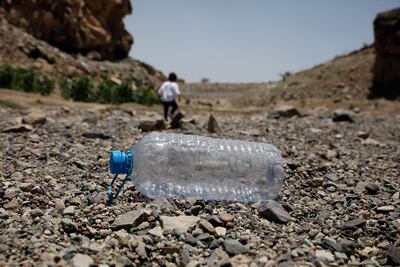Vulnerable Middle East countries affected by conflict should be offered easier access to global finance to help mitigate the effects of climate change, humanitarian experts said on Thursday.
In a joint report focusing on Iraq, Syria and Yemen, the International Committee of the Red Cross and the Norwegian Red Cross said the combined effects of climate change and armed conflict were creating an alarming mix of humanitarian crises.
Despite their vulnerability, countries plagued by conflict are almost entirely excluded from meaningful financing to mitigate the effects of climate change, the report said.
An adviser to the UAE Cop28 team and the ICRC has called for a global pact to streamline the application process for climate finance to be high on the agenda of discussions for the global climate change conference at Expo City Dubai in November.
“Those most vulnerable to climate change and affected by conflict receive the least of the climate finance action,” Helena de Jong, a senior adviser for the UAE Cop28 team told a forum in Dubai to discuss the Red Cross report.
ICRC
“This is a very serious problem, as it becomes a vicious cycle of conflict and climate change that governments struggle to deal with.
“This is something we would like to see change but it is not easy and is a complicated problem.
“The advantage of focusing on this as the Cop28 presidency is that we can talk with all these climate finance profilers, to the multilateral development banks and to the humanitarian and peacebuilding actors in this space to bring all of them together to look at the solutions,” Ms De Jong said.
The Climate Funds Update database, which collates information from 27 UN, World Bank and other multilateral funds, listed only 19 single-country projects in Iraq, Syria and Yemen that have been approved for funding as of January 2022.
The total amount disbursed to date is just $20.6 million, according to the report, less than 0.5 per cent of the money spent on climate projects worldwide.
“It won’t happen overnight and it won’t be all different after Cop28, but we want to see a big step forward,” Ms De Jong said.
“My dream outcome would be to have some global pact that all these actors will sign up to that does not include just principles that we all agree on, but would also include solutions to these issues.”
Extreme weather events such as drought and intense rainfall are becoming more common in the region, as are high temperatures, while access to fresh water is dwindling.
Long, drawn-out conflicts have undermined institutional capacity in environmental governance and taken a toll on natural resources.

While access to clean water becomes more challenging, livelihoods are disrupted and health problems such as malnutrition, water-borne diseases and respiratory illnesses become increasingly common.
The UN ranks Iraq, still recovering from decades of conflict, as one of five countries most affected by the effects of climate change, including drought.
Syria is also at heightened risk after more than a decade of war that has battered the country's infrastructure.
Clare Dalton, ICRC head of delegation in the UAE, said more support for areas affected by conflict should arise from discussions during Cop28.
“Our hope is that climate financing is better directed to countries experiencing conflict in ways that they can actively apply and use it,” she said.
“The big challenge is knowing why this is not happening already.
“It is difficult working in countries affected by conflict, when there often isn’t even a banking system you can trust. There are many factors.
“It takes all parts of society and sectors to address this.”
One region exposed to humanitarian challenges highlighted by the Red Cross is the Ahwar of Southern Iraq – also known as the Iraqi Marshlands.
Located on the crossroads of conflict and environmental degradation during the 1990s, the region was dried to punish the opposition during the civil war.
The effects are still felt today, with water levels and quality now much lower, affectinf agriculture and biodiversity.
According to the 56-page report, current climate finance distributions almost entirely exclude the most fragile and unstable places.
That must change after Cop28, Ms Dalton said.
“We all know this needs to happen, the question is how,” she said.
“It should not just be addressed in formal negotiations [at Cop)]but the UAE can become a platform and provide a space for actors to come together to address the issues.
“Places like Somalia, Yemen and Iraq all need this support.”


